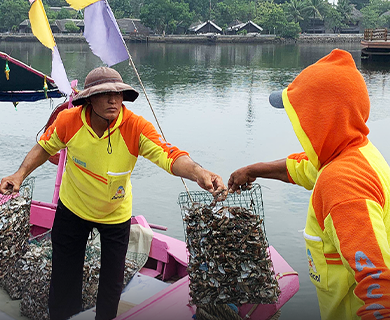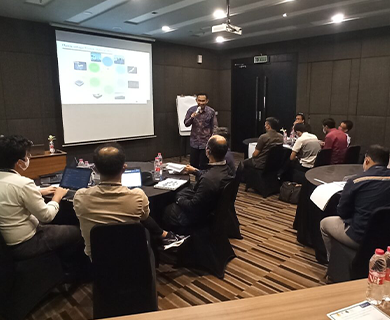EXPERTISE /
Kajian

Recognizing the wealth of resources and expertise at our disposal, the Center of Sustainability and Waste Management Universitas Indonesia (CSWM UI) adopts a detailed and focused approach to solve sustainability and waste management challenges.
Our first step is implying a comprehensive studies across various facets of these struggles. We believe that informed decisions stem from a thorough understanding of the subject’s matter and its contextual variations. Discover the outcomes of our extensive research and investigations in sustainability and waste management.
Click on each section to dive deeper into our findings.
Green Research
The 17 Sustainable Development Goals (SDGs) established by the United Nations need a deep examination to be applied to specific regions. Our multidisciplinary methodology enables comprehensive analysis of each of the 17 goals from diverse perspectives, including engineering, economics, social sciences, cultural studies, and governmental policies.
Therefore, The Center of Sustainability and Waste Management Universitas Indonesia (CSWM UI) conducts in-depth research, especially in polymer with our Green Polymer Technology Laboratory (GPTech Lab) located in Universitas Indonesia Complex, Depok, West Java to define optimal approaches and their contextual applications that is specifically unique just for Indonesia.
Feasibility Analysis
CSWM UI’s feasibility analysis offers a detailed examination that include market research, technological feasibility, economical analysis, and supply chain analysis. From investigating the business model up to evaluating day-to-day operations, our in-depth analysis ensure a well-informed and data-based approach to sustainable waste management.
New business possibilities would open up to your organization once sustainability and waste management efforts are being applied. We are able to provide you with end-to-end surveys, market research, market sizing, life cycle analysis (LCA) consumer behavior, and marketing strategies for you to explore new products and potential buyers from various industries such as polymers, FMCGs, energy chemical and other recycled and/or green-based goods and services.
Additionally, supply Chain Management is one of the crucial item that your businesses needed to have. We are able to provide you with Material Flow Analysis (MFA), Material Flow Analysis cost accounting (ISO 14051), Supply Chain Management (SCM), and Value Chain Analysis for your organization’s sustainability efforts.
Waste Management
CSWM UI is equipped & specialized in creating recycling hubs tailor-made for your specific requirements and location. Our extensive experience includes on-going projects such as waste management system at Universitas Indonesia complex in Depok, West Java.
We craft tailored solutions to optimize waste management practices starting from initial planning up to the development of facilities, infrastructure, regulatory compliance, and on-site awareness campaigns.
Policy Briefs
Collaboration between academia, organizations and governments is the key to further advancing all parties’ efforts on sustainability and waste management. As the academia we provide sustainable in-depth recommendations for policy and regulation that could be applied in Indonesia.
Find our specialized field of recommendations here: BPA in drinking water gallons, Plastic tax, Extended Producers Responsibility (EPR), Hazardous Chemical Requirements for International and Domestic Tradings
Carbon Footprint Analysis
Knowing your organization’s carbon footprint is the essential part to start sustainable waste management effort. We are using the standards set by Intergovernmental Panel on Climate Change (IPCC), Global Reporting Index (GRI), Voluntary Carbon Market (VCM), and Indonesia’s Ministry of Environment and Forestry to determine your organization’s current carbon emission level and giving an actionable plan to lower your current carbon emission level.
Forecast and Projections
We are able to do static and dynamic projections of your organization’s sustainability efforts such as carbon emission, environmental impact, nation-wide strategies, nature-based solution (NBS) and technology-based solution (TBS) impact, etc and determine its performances through intensive analysis and studies supported by prime simulation tools and softwares

